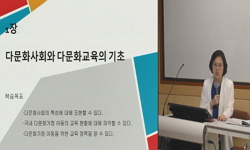본 연구는 문화상대주의와 문화정치학을 수렴하는 비판적 다문화주의 관점에서 다문화적 시민성을 정립하고, 이를 함양할 수 있는 학교급별 다문화교육 내용 체계를 구성하고 프로그램 예...
http://chineseinput.net/에서 pinyin(병음)방식으로 중국어를 변환할 수 있습니다.
변환된 중국어를 복사하여 사용하시면 됩니다.
- 中文 을 입력하시려면 zhongwen을 입력하시고 space를누르시면됩니다.
- 北京 을 입력하시려면 beijing을 입력하시고 space를 누르시면 됩니다.
다문화적 시민성 함양을 위한 다문화교육 내용체계 연구
한글로보기https://www.riss.kr/link?id=G3733913
- 저자
-
발행기관
-
-
발행연도
2011년
-
작성언어
Korean
- 주제어
-
자료형태
한국연구재단(NRF)
-
0
상세조회 -
0
다운로드
부가정보
국문 초록 (Abstract)
이를 위해 첫째, 다문화교육 내용체계에 대한 기초를 제공하기 위해 다문화 교육 연구학교를 대상으로 다문화교육이 학교 현장에서 구체적으로 어떻게 나타나는지를 분석하였다. 분석 결과를 바탕으로 향후 다문화교육의 방향과 내용 구성 체계에 대한 시사점을 제시하였다.
둘째, 다문화주의 유형들을 검토하고, 이로부터 문화상대주의 관점과 문화정치학 관점을 도출하였으며, 두 관점에서 다문화 시민성의 방향을 모색하였다. 아울러 다문화주의와 다문화교육 전문가들을 대상으로 2차에 걸쳐 실시한 델파이 조사를 통해 다문화 시민성의 내용과 인지적ㆍ가치적ㆍ기능적 측면에서 하위 목표를 추출하였다. 조사 자료에 대한 분석 결과를 정리하여 도출된 다문화 시민성은 다음과 같다. 다문화 시민성은 첫째, 인간적인 삶을 위하여 필요한 인권(공통의 권리와 집단 차등적 권리) 등의 가치를 이해하고 실행한다. 둘째, 사회 내에 존재하는 불평등을 인식하고 이에 대한 사회구조적 원인을 파악하며, 이를 개선하기 위한 참여와 연대를 행한다. 셋째, 집단 간 차이와 다양성을 인정하고 자신의 문화 정체성을 이해하고 다른 문화에 대하여 관용한다.
셋째, 전문가 집단을 대상으로 3차에 걸친 델파이 조사와 결과 분석을 실시하여 다문화 시민성을 바탕으로 한 학교급별 교육목표와 내용체계를 구성하였다. 학교급별 교육목표는 다문화 시민성이라는 다문화교육의 목표 지향과 관련하여 학생들의 발달 과정을 고려하여 인지적, 가치적, 기능적 교육 목표를 세심하게 구분하여 제시하였다. 또한 학교급별 다문화 교육 목표 체계를 고려하여 수업에서 적용가능 하도록 다문화교육 내용체계를 구성하였다.
넷째, 본 연구의 다문화 시민성 함양을 목표로 초·중·고 다문화 교육 프로그램을 제작하였다. 프로그램은 전문가 조사와 숙의의 과정을 통해 구성된 학교급별 교육목표와 내용체계를 바탕으로 현직 교사들에 의해 제작되었고, 시범적용과 전문가 평가를 실시하여 수정 보완하였다.
본 연구는 문화상대주의와 문화정치학을 수렴하는 비판적 다문화주의 관점에서 다문화적 시민성을 정립하고, 이를 함양할 수 있는 학교급별 다문화교육 내용 체계를 구성하고 프로그램 예시안을 개발함으로써 다문화교육의 방향을 제시하려는 목적을 갖는다.
이를 위해 첫째, 다문화교육 내용체계에 대한 기초를 제공하기 위해 다문화 교육 연구학교를 대상으로 다문화교육이 학교 현장에서 구체적으로 어떻게 나타나는지를 분석하였다. 분석 결과를 바탕으로 향후 다문화교육의 방향과 내용 구성 체계에 대한 시사점을 제시하였다.
둘째, 다문화주의 유형들을 검토하고, 이로부터 문화상대주의 관점과 문화정치학 관점을 도출하였으며, 두 관점에서 다문화 시민성의 방향을 모색하였다. 아울러 다문화주의와 다문화교육 전문가들을 대상으로 2차에 걸쳐 실시한 델파이 조사를 통해 다문화 시민성의 내용과 인지적ㆍ가치적ㆍ기능적 측면에서 하위 목표를 추출하였다. 조사 자료에 대한 분석 결과를 정리하여 도출된 다문화 시민성은 다음과 같다. 다문화 시민성은 첫째, 인간적인 삶을 위하여 필요한 인권(공통의 권리와 집단 차등적 권리) 등의 가치를 이해하고 실행한다. 둘째, 사회 내에 존재하는 불평등을 인식하고 이에 대한 사회구조적 원인을 파악하며, 이를 개선하기 위한 참여와 연대를 행한다. 셋째, 집단 간 차이와 다양성을 인정하고 자신의 문화 정체성을 이해하고 다른 문화에 대하여 관용한다.
셋째, 전문가 집단을 대상으로 3차에 걸친 델파이 조사와 결과 분석을 실시하여 다문화 시민성을 바탕으로 한 학교급별 교육목표와 내용체계를 구성하였다. 학교급별 교육목표는 다문화 시민성이라는 다문화교육의 목표 지향과 관련하여 학생들의 발달 과정을 고려하여 인지적, 가치적, 기능적 교육 목표를 세심하게 구분하여 제시하였다. 또한 학교급별 다문화 교육 목표 체계를 고려하여 수업에서 적용가능 하도록 다문화교육 내용체계를 구성하였다.
넷째, 본 연구의 다문화 시민성 함양을 목표로 초·중·고 다문화 교육 프로그램을 제작하였다. 프로그램은 전문가 조사와 숙의의 과정을 통해 구성된 학교급별 교육목표와 내용체계를 바탕으로 현직 교사들에 의해 제작되었고, 시범적용과 전문가 평가를 실시하여 수정 보완하였다.
다국어 초록 (Multilingual Abstract)
Secondly, this study discussed the types of multiculturalism from which two perspectives of cultural relativism and cultural politics on multicultural citizenship are derived. Then, delphi surveys of experts on multiculturalism and multicultural education were conducted in twice to find the educational goals and cognitive, affective and skill objectives of multicultural citizenship. The results of the analysis can be summarized as follows. The multicultural citizenship was characterized firstly as understanding and putting into practice the value of both common and group-differentiated rights necessary for living as a human; secondly as recognizing social inequality and its causes and attempting to participate and build solidarity for the solution of such social problems; thirdly, as recognizing cultural identity and diversity among culturally different groups.
Thirdly, delphi surveys of experts were conducted in three times to find the educational goals and curriculum contents of multicultural citizenship for elementary, middle and high school students. The cognitive, affective and skill objectives of multicultural education based upon multicultural citizenship were carefully suggested, considering the development level of elementary, middle, and high school students. This study also suggested the contents of multicultural education in order to organize teaching activities.
Fourthly, this study produced the program of multicultural education for elementary, middle and high school students on the basis of the educational goals and curriculum contents for them.
From the viewpoint of critical multiculturalism embracing cultural relativism and cultural politics, this study is aimed to guide a new direction of multicultural education by establishing multicultural citizenship and constructing the content and tea...
From the viewpoint of critical multiculturalism embracing cultural relativism and cultural politics, this study is aimed to guide a new direction of multicultural education by establishing multicultural citizenship and constructing the content and teaching materials of multicultural education based on it. For that purpose, this study firstly investigated the content and implementation of multicultural education at schools to establish the basis for a new direction and content system of multicultural education.
Secondly, this study discussed the types of multiculturalism from which two perspectives of cultural relativism and cultural politics on multicultural citizenship are derived. Then, delphi surveys of experts on multiculturalism and multicultural education were conducted in twice to find the educational goals and cognitive, affective and skill objectives of multicultural citizenship. The results of the analysis can be summarized as follows. The multicultural citizenship was characterized firstly as understanding and putting into practice the value of both common and group-differentiated rights necessary for living as a human; secondly as recognizing social inequality and its causes and attempting to participate and build solidarity for the solution of such social problems; thirdly, as recognizing cultural identity and diversity among culturally different groups.
Thirdly, delphi surveys of experts were conducted in three times to find the educational goals and curriculum contents of multicultural citizenship for elementary, middle and high school students. The cognitive, affective and skill objectives of multicultural education based upon multicultural citizenship were carefully suggested, considering the development level of elementary, middle, and high school students. This study also suggested the contents of multicultural education in order to organize teaching activities.
Fourthly, this study produced the program of multicultural education for elementary, middle and high school students on the basis of the educational goals and curriculum contents for them.











